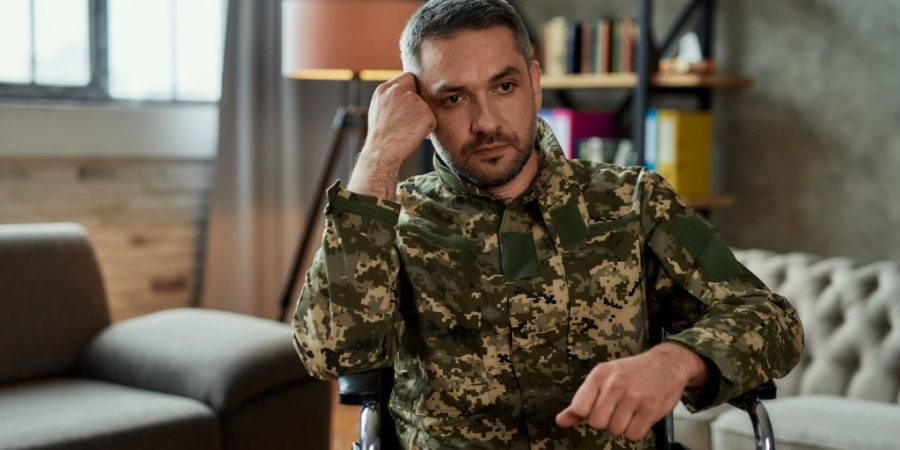
Post-traumatic stress disorder (PTSD) is a mental disorder that affects individuals who have lived through traumatic experiences. As it can have serious physical, mental, and social ramifications if left unaddressed, it is crucial for people to learn how to treat PTSD. With the proper support and professional aid, anyone can overcome their symptoms and minimize the impact of trauma on their life.
Table of Contents
Veterans with PTSD


While anyone can develop PTSD in the wake of a traumatic event, veterans are far more likely to be diagnosed with PTSD than their civilian counterparts. This is due to their increased likelihood of living through experiences considered traumatic.
For example, veterans often must deal with combat exposure, food insecurity, complicated grief, sexual assault, and more. Knowing how to treat PTSD is an important factor in whether someone can successfully recover from these experiences.
In addition, there is no doubt that military life is physically demanding. It often exposes someone’s body to harsh conditions and expects them to maintain a high degree of fitness. Furthermore, some people may sustain permanent damage during their time in the military or end up living with chronic pain.
However, upon returning home, these experiences take a severe mental toll as well. Veterans often fight an uphill battle to stabilize and improve their mental health. More than 30,000 veterans and active service members have died by suicide since 9/11, while only about 7,000 have died during war operations in the same timeframe.
If more individuals understood how to treat PTSD, the high rate of veteran suicide would most likely decrease. More people would seek help, and they could identify whether that help was effective enough to help them with their symptoms. Today, we hope to bridge the gaps in people’s understanding of PTSD treatment to take a step toward this reality.
Long-Term Effects of PTSD
Years of observation have shown PTSD to be a progressive disorder. In other words, if someone does not understand how to treat PTSD, their symptoms will likely continue to worsen, and new symptoms may arise as well.
For instance, some long-term effects of PTSD may include an increased risk for:
- Relationship strain or social withdrawal
- Sleep problems
- Substance abuse
- Heart disease
- Depression and anxiety
- Chronic pain or fatigue
- Fibromyalgia
- Hypertension
Having PTSD does not guarantee that people will feel a certain way or develop any additional problems, but it is important to be aware of the correlations it shares with other conditions. By reaching out for help and learning more about how to treat PTSD, people can avoid many of these potential risks.
How to Treat PTSD in Veterans
Many individuals worry about the fact that PTSD cannot be cured in the same way as other diseases and ailments. However, this does not mean that nothing can be done to improve someone’s experiences and alleviate their symptoms of PTSD.
Thankfully, due to the research efforts of mental health professionals throughout the world, treatment centers like Heroes’ Mile have developed a keen understanding of how to treat PTSD. Using the treatment modalities outlined below, people with PTSD can learn how to manage their symptoms and reclaim a sense of normalcy in their lives.
Psychotherapy
One of the most widespread and effective methods of how to treat PTSD involves psychotherapy, or talk therapy. Psychotherapy comes in many forms to help people tackle their problems with the guidance of a doctor or therapist.
For example, common types of talk therapies used to treat PTSD include:
- Cognitive behavioral therapy (CBT). By emphasizing the relationships between thoughts, feelings, and behaviors, CBT helps people work through unhealthy thought processes. They try new behaviors to disprove negative thoughts and replace them with healthier alternatives.
- Eye movement desensitization and reprocessing (EMDR). EMDR utilizes repetitive movements to help people work through past trauma. If they feel guilt, anxiety, or remorse regarding an event from their past, EMDR can help them process it in a complete and safe manner.
- Exposure therapy. Some people with PTSD find their fight-or-flight response triggered by certain situations. Exposure therapy helps them engage with triggering stimuli in a gradual, controlled manner, which makes them less likely to find it as triggering in the future.
Psychotherapy appears at the forefront of any discussion about how to treat PTSD, and for good reason. When someone discovers a type of therapy that resonates with them, they see vast improvements in their symptoms and make great strides toward living normally with their PTSD.
PTSD Medication


For some people with PTSD, psychotherapy alone may not be enough for them to find relief from their symptoms. Fortunately, other treatment options exist as well, including medications. The FDA-approved medications for PTSD are all selective serotonin reuptake inhibitors (SSRIs).
In addition to treating PTSD, SSRIs are commonly used to combat depression. They work by increasing the flow of a neurotransmitter in the brain called serotonin. Higher levels of serotonin mean that the body can more easily regulate things like mood, sleep, and energy.
Understandably, the regulation of all three helps those with PTSD cope with the negativity surrounding their trauma. For this reason, medications are frequently mentioned in the discussion of how to treat PTSD. They are a great tool to decrease the emotional strain of PTSD and make it easier to focus on recovery in other areas, such as through psychotherapy.
Furthermore, keep in mind that numerous types of medications exist. Even if someone shows a poor reaction to one medication, they may find another that works for them with minimal side effects. In learning how to treat PTSD, it is important to accept that patience is part of the process. It can take time to discover the treatment options that work best for someone.
We Treat PTSD in Veterans
Heroes’ Mile is an addiction and mental health treatment center for veterans. Our dedication to trauma-informed care means we know how to treat PTSD in veterans without sacrificing compassion, respect, or dignity. If you battle PTSD, depression, anxiety, substance abuse, or another mental health condition, Heroes’ Mile can help.
In addition to the treatment options discussed above, Heroes’ Mile also utilizes others, such as:
Veterans in our care can participate in all of these treatment options through one of our many treatment programs. Moreover, our programs vary in intensity and level of commitment, meaning that someone can receive the treatment they need no matter their personal situation.
We Know How to Treat PTSD
Heroes’ Mile is the best option for recovering service members because we were built by veterans, for veterans. We understand better than most how to treat PTSD from military service because the majority of our staff members have faced similar challenges themselves.
Likewise, all the patients at Heroes’ Mile are veterans as well. This means that everyone is surrounded by peers who can relate to their experiences and bond over mutual battles, past and present alike. These bonds have the potential to transcend treatment and lead to lifelong, irreplaceable friendships.
If you have any additional questions or you would like to begin treatment for PTSD, make today the first day of your recovery. Call us at 888-838-6692 or submit a confidential contact form online to connect with our admissions team. They will guide you through the enrollment process and help you take the next steps toward long-term stability and happiness.
The post How to Treat PTSD: Overcoming Trauma as a Veteran appeared first on Heroes’ Mile Veterans Recovery Center.
Source
Original Author: Heroes’ Mile

